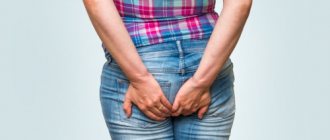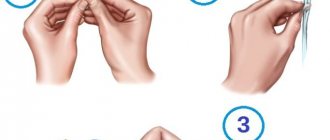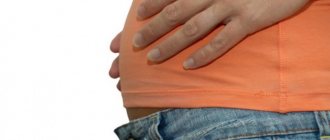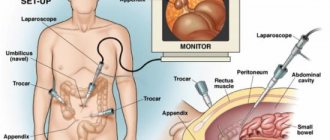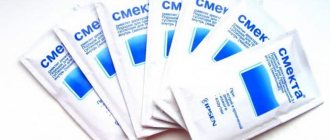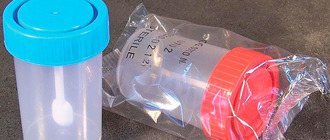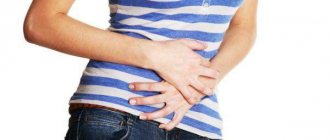- Causes of pathology
- Treatment of pathology
The sensation of a foreign body appearing in the anus is usually caused by conditions that are not life-threatening. Moreover, they can be very strong and even unbearable, since nerve endings are located in the anus. In some cases, such a symptom may indicate the presence of serious diseases.
Pathogenesis and etiology
The occurrence of a sensation of a foreign body in the rectum serves as a signal for the development of an organic or functional pathological process. The feeling of a foreign body occurs as a result of excessive irritation of the receptors of the autonomic nervous system located in the serosa of the intestine and innervating its layers.
Overexcitation of nerve fibers occurs due to mechanical trauma, the presence of a solid object in the intestinal lumen, an inflammatory process in the mucous layer, or when the venous hemorrhoidal plexuses expand in the area of the terminal rectum.
Let's take a closer look at the reasons for the development of this symptom and its variability depending on the specific disease. The most common causes of a feeling of a foreign body in the rectal area include:
- Hemorrhoids and thrombosis of internal hemorrhoids. Hemorrhoids are one of the most common diseases in proctology. Inflammation of hemorrhoids occurs as a result of weakening muscle tone and the ligamentous apparatus of the pelvic floor, as well as as a result of increased pressure in the abdominal cavity, which leads to overflow of the hemorrhoidal venous plexuses with blood, their gradual expansion and enlargement. Hemorrhoids swell, significantly narrowing the lumen of the rectum, causing discomfort and the sensation of a foreign object in the rectum.
- Complication of acute paraproctitis. Paraproctitis is in second place in terms of prevalence and also has this symptom in the clinic. Inflammation of the perirectal tissue and diffuse expansion of the layers of the rectum leads to the development of tissue swelling and irritation of sensitive nerve fibers, creating a feeling of discomfort.
- Papillitis and cryptitis. Local processes, with this pathology, inflammation is located only in the mucous membrane of the rectum and can cause the sensation of the presence of a foreign body.
- Damage to the rectal mucosa. Mechanical damage to the mucosa causes a reaction from the nerve endings. Injury to the epithelial layer of the rectum can occur either externally from a foreign object or during defecation due to excessively hard stool.
- Internal papillomas. The development of a benign oncological process can also lead to mechanical irritation of the receptors. Papillomas are peculiar growths on the mucous membrane, formed as a result of cellular atypia and rapid cell proliferation.
- Other cancers of the terminal colon. These include malignant neoplasms that affect all layers of the rectum. Invasion of atypical cancer cells into healthy tissue leads to the destruction of nerve fibers and the emergence of complaints about the presence of a foreign body in the anus.
- Neuroendocrine disorders associated with diabetes mellitus. Diabetes mellitus leads to an increase in the concentration of glucose in the blood plasma, which gradually destroys nerve fibers and leads to the development of these symptoms.
- Uterine fibroids. The disease, which occurs only in women, is characterized by damage to the uterine myometrium by benign tumors with a predominantly nodular exophytic growth pattern. Myomatous nodes localized on the posterior surface of the uterus can exert active mechanical compression of the rectum, leading to irritation of the nerve fibers located in the serosa of the intestine.
- Prostate adenoma is a disease that occurs only in men, in which a benign tumor process develops in the tissues of the prostate gland. Anatomically, the prostate gland has a close relationship with other pelvic organs, including the rectum. With a significant increase in the size of the tumor and prostate gland, compression of the rectum occurs with the formation of a sensation of a foreign body inside the intestine. Prostatitis can also create similar symptoms.
- Viral hepatitis and liver cirrhosis. With these diseases, the formation of portal hypertension syndrome occurs, leading to an increase in venous pressure in the portal vein system and causing compensatory discharge of blood through the anastomoses. Such anastomoses include hemorrhoidal plexuses. The picture is worsened by ascites, which increases intra-abdominal pressure and worsens hemorrhoids.
- Psychogenic diseases, for example, neurotic conditions or depression. In this case, the symptom of feeling a foreign body in the rectum will not be somatic, but of a neuropsychic origin.
- Pregnancy is one of the most common and physiological causes of this symptom. During pregnancy, significant growth of the uterus occurs along with the fetus, which leads to direct compression of the rectum, increased intra-abdominal pressure, and the occurrence of hemorrhoids.
- Intestinal dysbiosis with diarrhea. Inflammatory processes in the terminal parts of the large intestine lead to symptoms similar to colitis, including irritation of nerve fibers due to the inflammatory process in the intestine.
How to recognize colorectal cancer
Rectal cancer, like many other cancers, would be much less common if people did not neglect regular preventive examinations.
Unfortunately, many seek medical help in later stages, when the cancer begins to cause significant discomfort. So what can you do to detect colorectal cancer early? In the first stages, rectal cancer is often asymptomatic. The first signs of the disease usually include unstable stools and heaviness in the rectum. As the tumor develops, the patient may exhibit other symptoms that may indicate the development of colorectal cancer, including:
- Discharge from the anus
- Itching, pain or discomfort in the rectum
- False urge to defecate
- Painful bowel movement
People who are in the “risk zone”, that is, are more susceptible to rectal cancer, should be especially attentive to the signals of their own body. Despite the fact that the exact causes of the formation of a malignant tumor in the rectum are not known, it has been proven that this disease is more common among “people of civilization.” Thus, the main risk factor for colorectal cancer is the “Western” diet, that is, high consumption of animal fats and preservatives. This explains the fact that in Asian countries, where the diet is based on vegetarian foods, colorectal cancer is much less common than in other developed countries. A sedentary lifestyle and genetic predisposition also increase the likelihood of developing cancer.
The presence of any of the symptoms of colorectal cancer should be a reason to consult a doctor. The most accurate way to diagnose the disease is colonoscopy. This procedure is recommended for everyone after 40 years of age, even if there are no complaints. Don't forget that your chances of recovery largely depend on what stage the cancer was diagnosed at.
Discomfort in the rectum after ST
Good afternoon,
Tell me what could happen with these symptoms.
A little over a month ago I had a cleanse due to a missed abortion.
After cleaning, I bled for about two weeks, and after 32 days my period came. Which I was happy for the first time in the last few years.
Now about what worries me:
after cleaning there were very unpleasant sensations in the stomach and rectal area. Moreover. sometimes there was a feeling that there was hmm. excuse me, the fart was running around and knocking on the walls of the intestine, and this was very painful. Then it passed.
I went to the gynecologist on the 5th day after the cleansing, they did an ultrasound and said that everything was fine. There was some fluid in the uterus, the radiologist said that these were the consequences of the cleansing and the amount corresponded to the fifth day after the cleansing.
When they did an ultrasound with a vaginal sensor and pressed down on the anus area, it was very painful for me, and the pain was in the intestines.
Outside of the ultrasound, nothing hurt, except for the aforementioned sensations of a “running fart”
Then these sensations passed, and now, when my period came, they appeared again. Or rather, now nothing hurts, just a very unpleasant sensation in the rectum, as if there was some kind of irritation and when you sit, it’s uncomfortable. There is no blood, the stool is loose, but not diarrhea. Chair every day.
My first guess was hemorrhoids, but there seems to be nothing on the outside, near the anus.
Please advise what could be causing this. and which doctor is better to go to. I thought about going to a proctologist, but it turned out that there is no such specialist here, but gastroenterologists. It’s also strange to me that outside of my period nothing really bothered me.
https://youtu.be/zb2YXmg2e5E
Clinical picture
The sensation of a foreign body in the anus can have a wide range of manifestations.
Depending on the specific disease, the duration, intensity and frequency of pain will vary significantly.
With hemorrhoids, the sensation of a foreign body and discomfort manifests itself in attacks and with high intensity. On the contrary, at the initial stage of development of rectal cancer, mild discomfort is observed, which gradually increases as the disease progresses.
An important diagnostic criterion in the study of this symptom is the connection between sensations and the patient’s body position. Increased pain in a sitting position indicates hemorrhoids, and persistent discomfort indicates cancer. If unpleasant sensations occur after eating rough food rich in fiber, then we can assume the presence of an inflammatory process in the large intestine.
With polyps or malignant neoplasms of the terminal sections of the large intestine, in addition to discomfort, an admixture of fresh blood appears in the stool. A similar picture will be with hemorrhoids, however, complaints of swelling in the anal area, or prolapse of hemorrhoids at a late stage of the disease may be added.
In addition to a detailed study of the disease history, to make a correct diagnosis, it is necessary to conduct a complete diagnosis of the patient’s body.
Hemorrhoids and paraproctitis
These two diseases most often cause a feeling of heaviness in the anus. It is almost always accompanied by pain, bleeding, burning, and problems with bowel movements.
Among the factors contributing to the development of unpleasant diseases are hereditary predisposition, diseases of the cardiovascular system, and a less active lifestyle.
The patient is led and observed by a proctologist, who must determine the cause of the feeling of heaviness and eliminate it.
Diagnostics
Examination of the patient plays an important role in determining the type, location and degree of development of pathology. After collecting anamnesis, the following types of laboratory and instrumental studies may be prescribed:
General and biochemical blood tests allow you to evaluate the leukocyte formula, the number of leukocytes, eosinophils, erythrocytes and hemoglobin, the amount of reactive protein by fraction, liver enzymes (ALT and AST), and also determine the presence of cancer markers.
- colonoscopy: allows using an endoscope and a monitor to evaluate the condition of the mucous membrane of the rectum and other parts of the large intestine under multiple magnification. During the procedure, an additional punch biopsy may be performed for histological examination for oncological pathology.
- irrigoscopy: an x-ray method for examining the large intestine, in which a contrast agent is injected through the rectum for visualization using x-rays. Irrigoscopy allows you to study the shape and size of the large intestine, filling defects or the presence of diverticulosis.
- anoscopy allows you to perform a visual assessment of the canal and ampulla of the rectum using an anoscope and diagnose hemorrhoids, anal fissure or the early stage of cryptitis.
- sigmoidoscopy of the rectum and sigmoid colon is performed after inflation of the intestinal lumen with gas and allows to confirm the presence of neoplasms.
- Computed tomography and magnetic resonance therapy allow for layer-by-layer scanning of the pelvic organs, including the rectum.
How to diagnose the cause
You should not try to independently identify the cause of the inflammatory process. Self-medication can cause unpleasant and serious consequences, including death. The first thing you should do is visit a proctologist.
Attention! If problems begin in a pregnant woman, you need to consult your treating gynecologist.
To detect heaviness in the anus and identify its causes, the doctor performs palpation. After a preliminary diagnosis, the patient is sent for tests and additional examinations:
- General analysis of stool, urine, blood.
- Checking stool for worm eggs.
- Biochemistry of blood.
- Instrumental examination of the rectum - colonoscopy, rectosigmoidoscopy, anoscopy.
Endoscopic methods for identifying the cause of the inflammatory process and the resulting heaviness in the anus almost 100% determine the disease .
To clarify the established diagnosis, it is possible to perform a biopsy of polyps, neoplasms, ulcerative foci of inflammation or other changes in the walls and mucous membrane of the rectum.
Based on the tests performed, the patient is prescribed an effective, effective treatment that will allow him to quickly cope with the signs of the disease.
Method of eliminating discomfort
Regardless of the results of the diagnosis, it is necessary to carry out comprehensive treatment of the disease that caused the appearance of these symptoms.
For an inflammatory process in the rectum, outpatient therapy with non-steroidal anti-inflammatory drugs in the form of tablets, rectal suppositories and ointments is effective.
Treatment with folk remedies is also highly effective, but medications should be used after consultation with your doctor. Currently, ointments based on plant components (aloe vera extract) with the addition of streptocide have proven themselves to be effective. You can also use warm baths with decoctions of oak, elm or periwinkle bark, which have a local anti-inflammatory and bactericidal effect.
Radical methods for eliminating pathological changes in the rectum are used only in emergency situations or chronic forms when conservative therapy methods are ineffective. They place a serious burden on the body, have an increased risk of developing postoperative complications and require a long rehabilitation period.
Surgical intervention is used for oncological diseases, for complicated paraproctitis or for thrombosis of hemorrhoids. As a result, the problem area is excised and the inflammatory process is eliminated.
Features of treatment
Once the causes of heaviness in the anus have been established, all treatment is aimed at eliminating the underlying disease that caused this condition. If the pathology occurs as a result of a severe disruption of the functioning of the digestive tract due to poor nutrition, then following a special diet is sufficient to get rid of unpleasant symptoms in the anus.
For inflammatory processes in the intestinal mucosa, medications are used that have anti-inflammatory, antibacterial effects, as well as means to normalize the functioning of the digestive system. For hemorrhoids and its complications, specialized ointments, rectal suppositories, and tablets with a venotonic effect are prescribed.
It is very important, despite the delicacy of the problem, to consult a doctor in time and not to self-medicate. Uncontrolled use of medications without identifying the cause that causes discomfort and a feeling of heaviness in the anus threatens serious complications and surgical intervention.
The initial visit to a proctologist in all patients is associated with discomfort in the anal area. A feeling of tugging in the anus can be either a symptom of a dangerous pathology or ordinary skin irritation due to neglect of personal hygiene.
Prevention
To avoid discomfort and the sensation of a foreign body in the anus, you must adhere to the following recommendations:
- Maintain personal hygiene. Use cleansing procedures daily, keep your body clean to avoid the formation of local inflammatory processes in the perineum.
- Use a balanced diet in terms of fiber, vitamins and microelements, excluding processed foods, spices, spicy and smoked foods and limiting carbohydrate intake.
- Maintain general muscle tone every day by walking, which strengthens the ligaments of the musculoskeletal system and prevents blood stagnation in the pelvic organs.
Paying close attention to your own body will allow you to maintain your ability to work and reduce the likelihood of developing dangerous complications.
The main causes of bloating
In addition to the listed diseases, a feeling of fullness can make itself felt with congenital pathology of the sacrum . At the stage of embryo formation, processes occur in the body in which a narrow cavity is formed in the coccyx area. Symptoms begin to appear when inflammatory processes develop.
In addition, among the diseases that affect the feeling of squeezing, there is irritable bowel syndrome . Patients complain that they do not seem to completely empty their intestines, talk about stomach pain, the appearance of mucus in the stool, flatulence, and constipation. Patients may experience nausea, back pain, heartburn, anxiety and exhaustion.
When to visit a doctor
Many patients endure such symptoms, because it is not customary to talk about such delicate problems in society. However, many are in no hurry to even go to doctors because of simple embarrassment. But the problem is not solved in any way, the pain becomes simply unbearable, and the disease becomes chronic.
Ovarian cyst - causes of pressure on the rectum in women
When discomfort occurs, you should definitely go to a medical facility. This must be done in the following situations:
- If purulent or bloody discharge appears.
- The feces have taken on a dark hue.
- Pain and discomfort do not go away for more than 7 days.
- There is a hereditary predisposition to proctological pathologies.
With the help of a timely diagnosis, you can find out the true cause of the discomfort that occurs.
Serious cases require increased attention. The doctor may prescribe a course of antibiotics, hemostatic agents, etc. Treatment tactics will depend on the stage of neglect of the situation.
In men
Diseases such as urethritis and prostatitis can cause discomfort and pain in the anus in men. With such pathologies, the pain is localized in the groin area, but during defecation it is also felt in the rectal area.
Inflammation of the prostate is a common disease in men; one of its symptoms is difficulty urinating. Discomfort in the anus and intestines is also a sign of illness.
There are many diseases that are not associated with disorders of the rectum; the pathology spreads to other organs of the abdominal cavity, but discomfort radiates to the rectal area and anal ring
Testicular diseases, cystitis, bladder pathologies, sexually transmitted infections also cause pain in the anal passage in men.
Prostatitis
Methods for diagnosing distension in the anal area
The first thing a doctor does when a patient comes to him is to find out the nature of the complaints. The doctor asks the patient about the intensity of the pain, what is causing it, and the presence or absence of constipation. The proctologist, having collected an anamnesis, conducts a digital examination of the anal canal and hemorrhoids. This method makes it possible to identify lumps on the walls of the intestine, compactions or other formations.
Diagnosis of hemorrhoids
To accurately establish the diagnosis and the degree of damage to the mucosa, as well as to identify neoplasms in the rectal cavity, anoscopy is performed. Using a short tube that is inserted into the anus, the mucous membrane is examined.
A more thorough examination is carried out using sigmoidoscopy. This method makes it possible to assess the condition of the mucosa along the entire length of the anal canal. The patient is also prescribed an ultrasound of the pelvic and abdominal organs, a general blood and urine test. According to indications, they suggest undergoing a CT scan. With the help of this examination, it is precisely determined at what stage of development the disease is. With the help of the diagnostics performed, the doctor determines the prescription of methods for the treatment.


